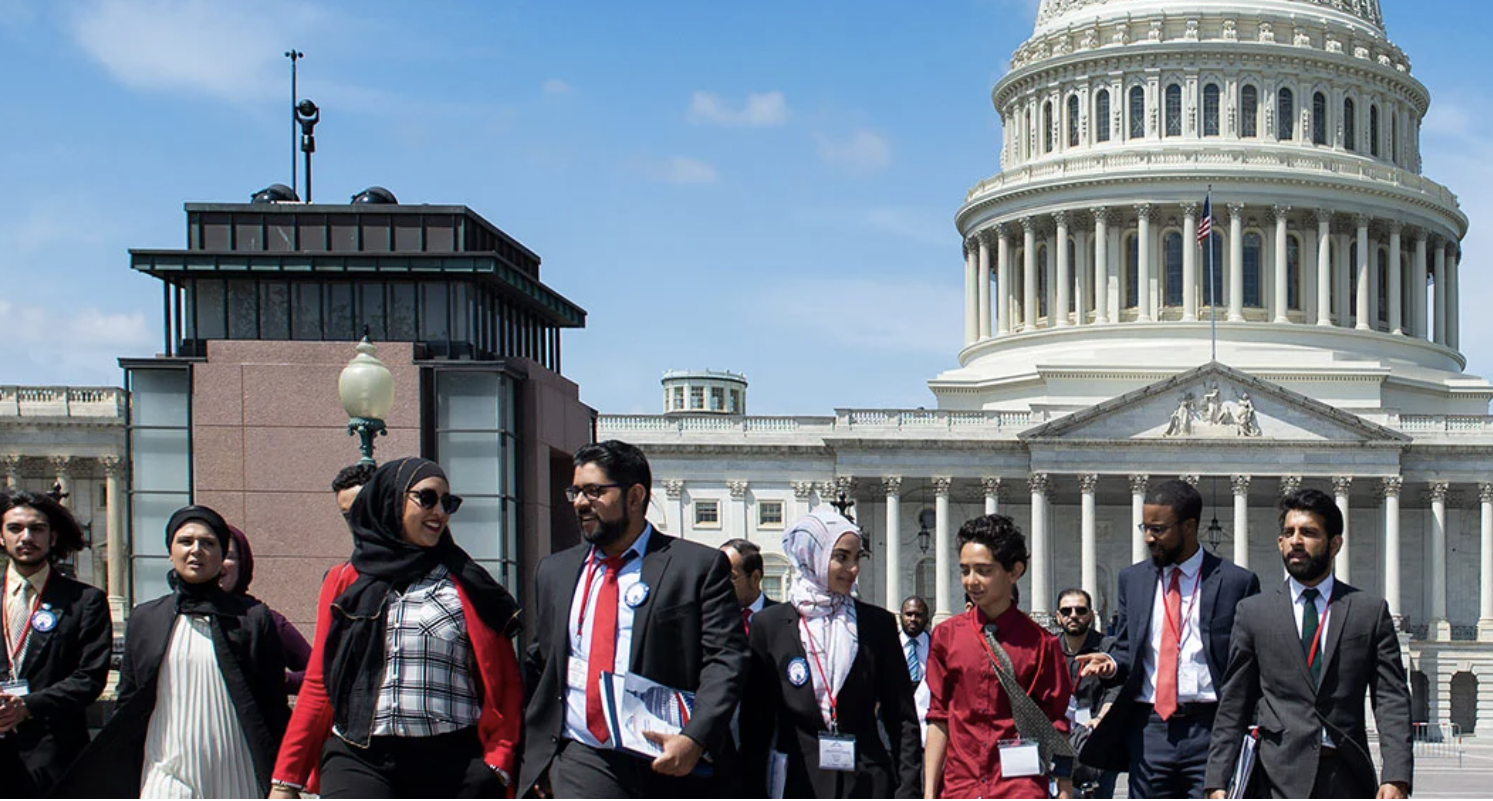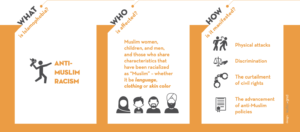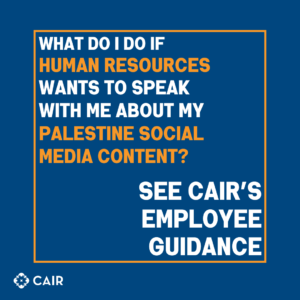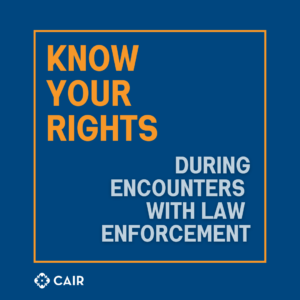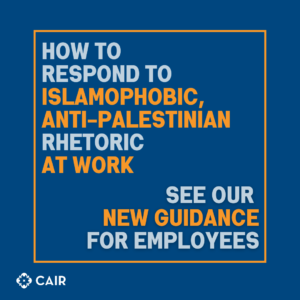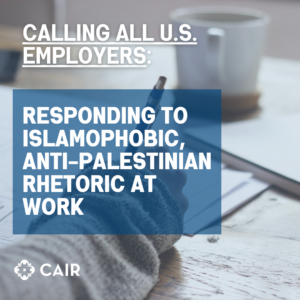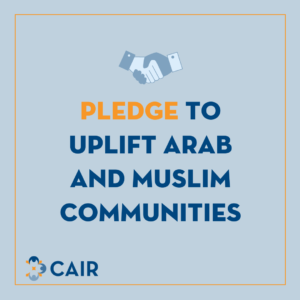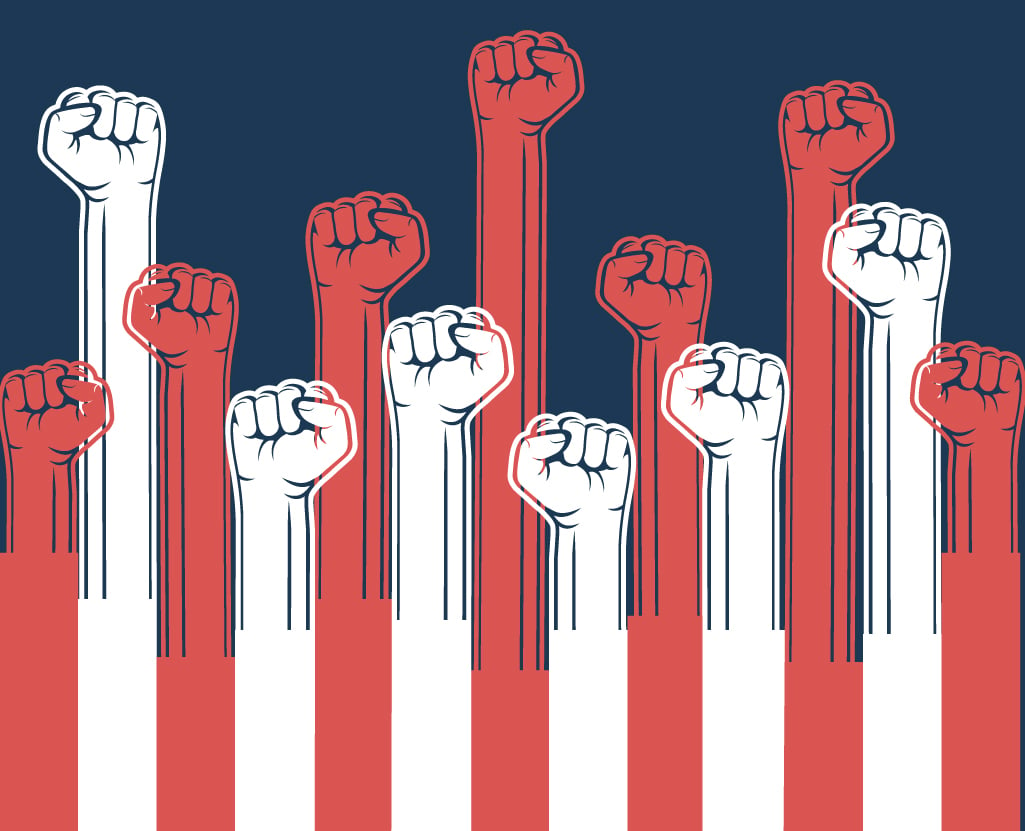The Council on American-Islamic Relations (CAIR), the nation’s largest Muslim civil rights and advocacy organization, is issuing guidance to students being targeted for advocating on behalf of Palestinian rights or because of their Muslim faith. This guidance focuses on speech rights in educational settings and addressing any bullying that may result.
“Students have the right to visibly practice their faith and peacefully advocate for human rights without facing harassment, threats or punishment,” said CAIR Research & Advocacy Director Corey Saylor. “We encourage K-12 schools, colleges and universities to address this sudden surge in reports of abusive and discriminatory behavior and express support for students of all backgrounds, including Muslims and Palestinians. We encourage students impacted to report any incidents of abuse and seek assistance. We are here to help.”
CAIR has seen and received multiple reports of students harassed online and at school due to advocacy for Palestinian human rights in recent days, including reports of bullying against visibly Muslim students and disciplinary action in public school settings and instances of threatening messages targeting college students online.
The organization encourages all students experiencing interference or suppression of their free speech in educational settings or harassment due to their faith to document the incident and contact CAIR promptly. CAIR asks the same in instances of anti-Muslim or anti-Palestinian bullying or harassment in school.
SEE: CAIR’s Report an Incident Form
CAIR’s Legal Team offers the following core tips to students asserting their free speech rights in educational settings. (Note: This does not constitute legal advice.)
1. Students in all levels of education are afforded free speech within the public school setting, with two caveats: a) disruptive speech is afforded less protection in the public school system (outside the school setting this would be fully protected); b) hate speech is not protected in public schools because of its disruptive nature, despite having at least partial protection in most other settings. The school disagreeing with your position or believing that your position is controversial does not necessarily mean that the speech is disruptive. Whether the speech is disruptive will depend on the circumstances.
2. You have the right to speak out, hand out flyers and petitions, and wear expressive clothing in school — as long as you don’t cause a disruption or violate the school’s content-neutral policies.
3. The Supreme Court has held that school authorities must respect students’ rights to express themselves outside of school, including their right to express dissenting or unpopular views. The exception is that speech outside of school may be punished in school if it’s targeted or disruptive of school, but the burden is on the school to show a significant impact.
4. The First Amendment also prohibits “viewpoint discrimination” – government action (which includes action by public university officials) that burdens or suppresses speech based on viewpoint. This means that if a student or a group is punished because administrators don’t like their message, the university may be held accountable for violating students’ constitutional rights. (This does not apply to public primary and secondary schools at the same level).
5. In the university context, students cannot be punished for publishing content on social media in most circumstances, unless it is threatening to the university, or members of the university- threats are never protected speech. The exception detailed in #3 applies at the public primary and secondary school level.
The team at Palestine Legal has prepared resources for students who are “advocating for justice in Palestine on campus.”
SEE: Palestine Legal’s Know Your Right’s Student Handbook
SEE ALSO: Palestine Legal’s Know Your Rights Video Series (videos 2 and 4 are specifically relevant to your speech)
Similarly, the National Lawyers Guild team prepared a guide focused on law enforcement overreach targeting protestors.
SEE: National Lawyers Guild Know Your Rights: A Guide for Protestors
We also recognize that various forms of doxxing, a form of intimidation intended to silence speech by putting a person’s private information online, may be occurring. The team at ReThink Media presented a best practices training for advocates on this issue which is reshared here.
SEE: ReThink Media’s Anti-Doxxing Resources
SEE ALSO: ReThink Media’s Training on Anti-Doxxing
CAIR also urges students in public school settings to read our recent guide offering practical steps for youth experiencing bullying in school and their families.
It includes advice such as how students can develop a plan to advocate for themselves in response to bullying, as well as step-by-step guidance for parents who seek to report incidents of bullying to school authorities.
The following tips apply if you are experiencing bullying due to pro-Palestine advocacy:
Take Care of Yourself and Your Peers
1. Experiencing bullying due to Palestine advocacy efforts can be difficult and scary. Maintain connections with peers and members of student organizations who can be a shoulder to lean on during challenging times.
2. If you have a connection to a trusted university official (faculty member, staff member, etc.), ask them for support and, if you do not feel comfortable leaving your dorm, a letter to excuse you from attending class.
3. If you are a leader or on the board of a student organization, consider hosting an event where affected students can share their experiences and feel supported. Also consider holding another event to invite a trusted university official (faculty member, staff member, etc.) who can listen to student concerns and recommend concrete actions for support.
Document and Report Incidents of Bullying
1. Document everything. Take detailed notes of what you experienced and pictures if applicable. These can be shared with attorneys if legal action is possible.
2. Identify and review school policies on bullying and discrimination. If comfortable, follow any channels to report incidents of bullying to university officials.
If university officials have been unresponsive and/or ineffective, contact outside organizations, such as Palestine Legal and the Council on American-Islamic Relations.
